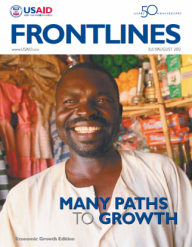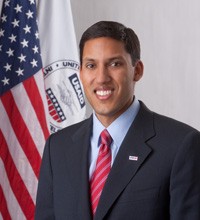For the vast majority of our history, humankind has been stuck in a trap. Up until the Industrial Revolution, every time the world became richer or technology led to advances, populations would subsequently grow. Aside from an extremely small number of royals and elites, people, on average, did not become wealthier. Economic growth and development as we understand it today simply did not occur.
But for the past 300 years, large parts of the world finally managed to spring that trap. The productivity gains of the Industrial Revolution took hold and the resulting economic growth began to lead to large, sustained increases in the global standard of living. The rising tide did not lift all boats—many countries were left underwater. As incomes rose and poverty fell in Europe and North America, countries in Asia and Africa saw much slower growth, leading to a great divergence between those in the West and those in the rest of the world.
For the next several decades, some developing countries began to climb out of poverty, while others were paralyzed by economic shocks. It was not until the end of the Cold War that the world witnessed the rapid growth of a very large group of emerging economies and democracies throughout Latin America, Asia and Africa.
There is no single recipe for delivering sustainable, broad-based economic growth, but over the course of our 50-year history, we have consistently identified three key ingredients. First, a country must have strong institutions—governments and civil societies that can accountably respond to people’s needs and aspirations. Second, a country must develop its sources of human capital and ensure that its people are healthy and educated enough to contribute to their societies and economies. And third, countries need a strong and dynamic private sector to efficiently allocate resources and stir innovation.
Around the world, our newly structured Bureau for Economic Growth, Education and Environment is working to drive and sustain prosperity, expand human potential and protect irreplaceable resources.
By giving people access to markets and boosting trade, we allow the world’s poor to play a productive role in their economies and sell goods and services. Today, teams are working at border crossings in the West Bank to improve the flow of goods; developing an industrial park and offering well-paid jobs in Haiti; and providing technical assistance and loan guarantees to entrepreneurs throughout Africa.
In classrooms throughout the world, our teams are working to ensure children don’t just have access to school but are actually learning. Through All Children Reading, our Grand Challenge for Development, we’ve received hundreds of submissions of ideas for new learning materials and methods; improved collection and analysis of education data; and invested in mobile phones, tablets and apps that promise to improve literacy. Those innovations will help drive an education strategy that will improve the reading skills of 100 million children by 2015.
And our climate specialists are working tirelessly, fighting deforestation, protecting biodiversity and mitigating the effects of climate change. Right now, staff in Brazil are helping train indigenous people as firefighters, giving them an opportunity to protect their communities and fight deforestation that can leave an irreplaceable mark on precious ecosystems.
Today, the spread of democracy, better human welfare and freer markets have led to higher growth rates in developing countries than in rich countries and—for the first time in history—a declining rate of poverty in every single region. USAID’s top recipients have done particularly well: Our top 21 recipients cut the number of those living in absolute poverty by 41 percent between 1993 and 2008. There are many who can claim credit for that rate of progress, the first being the countries themselves, but also well-deserving are our teams focused on growth, education and environmental protection.
Get regular Twitter updates from the USAID administrator @Rajshah










Comment
Make a general inquiry or suggest an improvement.